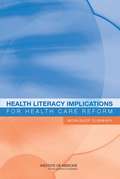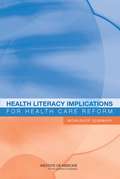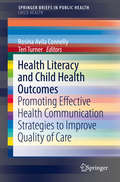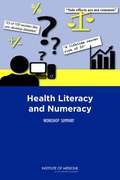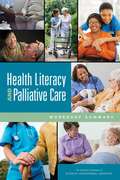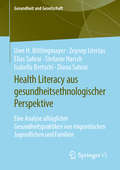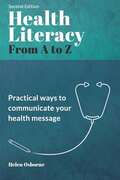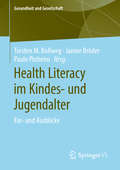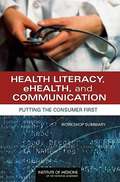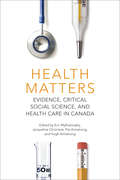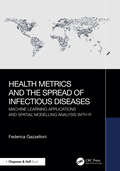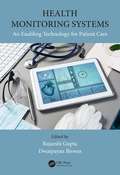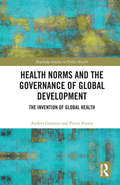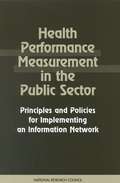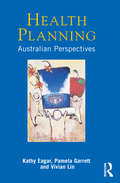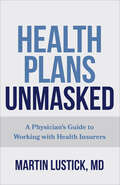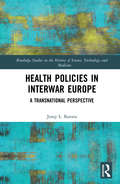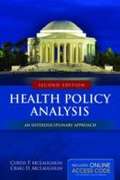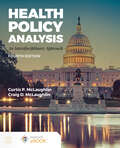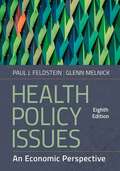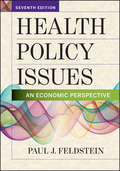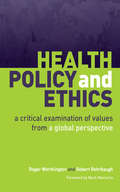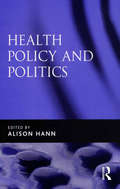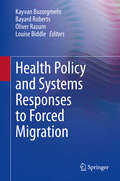- Table View
- List View
Health Literacy Implications for Health Care Reform: Workshop Summary
by The National Academy of SciencesHealth literacy is the degree to which one can understand and make decisions based on health information. Nearly 90 million adults in the United States have limited health literacy. While poor health literacy spans all demographics, rates of low health literacy are disproportionately higher among those with lower socioeconomic status, limited education, or limited English proficiency, as well as among the elderly and individuals with mental or physical disabilities. Studies have shown that there is a correlation between low health literacy and poor health outcomes. In 2010, President Obama signed the Affordable Care Act designed to extend access to health care coverage to millions of Americans who have been previously uninsured. Many of the newly eligible individuals who should benefit most from the ACA, however, are least prepared to realize those benefits as a result of low health literacy. They will face significant challenges understanding what coverage they are eligible for under the ACA, making informed choices about the best options for themselves and their families, and completing the enrollment process. Health Literacy Implications for Health Care Reformexplores opportunities to advance health literacy in association with the implementation of health care reform. The report focuses on building partnerships to advance the field of health literacy by translating research findings into practical strategies for implementation, and on educating the public, press, and policymakers regarding issues of health literacy.
Health Literacy Implications for Health Care Reform: Workshop Summary
by Theresa WizemannHealth literacy is the degree to which one can understand and make decisions based on health information. Nearly 90 million adults in the United States have limited health literacy. While poor health literacy spans all demographics, rates of low health literacy are disproportionately higher among those with lower socioeconomic status, limited education, or limited English proficiency, as well as among the elderly and individuals with mental or physical disabilities. Studies have shown that there is a correlation between low health literacy and poor health outcomes. In 2010, President Obama signed the Affordable Care Act designed to extend access to health care coverage to millions of Americans who have been previously uninsured. Many of the newly eligible individuals who should benefit most from the ACA, however, are least prepared to realize those benefits as a result of low health literacy. They will face significant challenges understanding what coverage they are eligible for under the ACA, making informed choices about the best options for themselves and their families, and completing the enrollment process. Health Literacy Implications for Health Care Reform explores opportunities to advance health literacy in association with the implementation of health care reform. The report focuses on building partnerships to advance the field of health literacy by translating research findings into practical strategies for implementation, and on educating the public, press, and policymakers regarding issues of health literacy.
Health Literacy and Child Health Outcomes
by Rosina Avila Connelly Teri TurnerThis compact resource presents current data on health literacy as it affects child health outcomes, with a sharp focus on improving communication between healthcare providers and pediatric patients and their families. A frequently overlooked social determinant of health in children, health literacy is shown as a critical skill for patients and families and a key aspect of patient engagement. The authors' evidence-based survey pinpoints common problems in healthcare providers' verbal and written communication with pediatric patients, their parents, and/or caregivers. Readers will learn about practical health literacy strategies for addressing and preventing miscommunication at the individual and systems levels. These improvements are linked to immediate results (e. g. , greater compliance, fewer medication errors) as well as improved long-term child health outcomes, including reduced health disparities and enhanced quality of life into adulthood. This transformative guide: #65533; Defines optimum health communication as necessary for working with all patients. #65533; Identifies common barriers to clear health communication. #65533; Traces the relationship between health literacy and child health outcomes, from the prenatal period and into young adulthood. #65533; Offers guidelines for creating effective patient education materials and a safe, health literacy oriented patient-centered environment. #65533; Integrates health literacy into health systems' quality improvement plans. Health Literacy and Child Health Outcomes informs students in MPH programs as well as public health scientists and scholars, and can also serve as an introductory text for students in public health ethics or a general applied ethics course. Public health professionals in diverse contexts such as local health departments and nonprofit organizations will appreciate its robust approach to ethical practice, professional development, and systems improvement. This will be a helpful guide for introducing health communication topics in medical education and allied health. Lastly, clinicians taking care of pediatric patients will find concise information and practical advice to apply in the clinical setting.
Health Literacy and Numeracy: Workshop Summary
by Melissa G. FrenchAlthough health literacy is commonly defined as an individual trait, it does not depend on the skills of individuals alone. Health literacy is the product of the interaction between individuals' capacities and the health literacy-related demands and complexities of the health care system. Specifically, the ability to understand, evaluate, and use numbers is important to making informed health care choices. "Health Literacy and Numeracy" is the summary of a workshop convened by The Institute of Medicine Roundtable on Health Literacy in July 2013 to discuss topics related to numeracy, including the effects of ill health on cognitive capacity, issues with communication of health information to the public, and communicating numeric information for decision making. This report includes a paper commissioned by the Roundtable, "Numeracy and the Affordable Care Act: Opportunities and Challenges," that discusses research findings about people's numeracy skill levels; the kinds of numeracy skills that are needed to select a health plan, choose treatments, and understand medication instructions; and how providers should communicate with those with low numeracy skills. The paper was featured in the workshop and served as the basis of discussion.
Health Literacy and Palliative Care: Workshop Summary
by Engineering Medicine National Academies of SciencesThe Institute of Medicine Roundtable on Health Literacy convened a 1-day public workshop to explore the relationship between palliative care and health literacy, and the importance of health literate communication in providing high-quality delivery of palliative care. Health Literacy and Palliative Care summarizes the discussions that occurred throughout the workshop and highlights the key lessons presented, practical strategies, and the needs and opportunities for improving health literacy in the United States.
Health Literacy aus gesundheitsethnologischer Perspektive: Eine Analyse alltäglicher Gesundheitspraktiken von migrantischen Jugendlichen und Familien (Gesundheit und Gesellschaft)
by Uwe H. Bittlingmayer Zeynep Islertas Elias Sahrai Stefanie Harsch Isabella Bertschi Diana SahraiIm vorliegenden Buch wird eine Gesundheitsethnologie der Gesundheitskompetenz von vulnerablen Gruppen vorgelegt. Dabei werden neben einem umfassenden Forschungsstand und die Entwicklung einer theorie-orientierten Health-Literacy-Forschung drei Fallstudien über vulnerable Minderheiten aus Deutschland und der Schweiz präsentiert. Besonders deutlich herausgestellt wird die soziale Dimension von Gesundheit und Gesundheitskompetenz, die in den individualistischen kompetenztheoretischen Zugängen kaum konzeptionalisiert werden kann.
Health Literacy from A to Z: Practical Ways to Communicate Your Health Message
by Helen OsborneThis book is written for someone who cares a lot about communicating health messages clearly and simply. It is also written for someone to whom health literacy is just one of many projects competing for time and attention. In other words, this book is written for you. This book is intended as an easy-to-use guide for health communications. It is written in a way to inform and inspire you, not overwhelm you. <p><p> There are 42 stand-alone chapters. Arranged alphabetically from A to Z, each chapter includes: -Starting Points. Introductory information providing context for strategies that follow. -Strategies, Ideas, and Suggestions. How-to ways of communicating clearly. -Stories from Practice. Real-life experiences that make key points "come alive."-Citations. References from books, podcasts, articles, and more. -Sources to Learn More. Resources to continue learning about each topic. Health Literacy from A to Z: Practical Ways To Communicate Your Health Message, Second Edition has won several awards of excellence. These include esteemed awards from the American Medical Writers Association and its New England chapter.
Health Literacy im Kindes- und Jugendalter: Ein- und Ausblicke (Gesundheit und Gesellschaft)
by Paulo Pinheiro Torsten M. Bollweg Janine BröderDas Thema Health Literacy, für das sich im deutschen Sprachgebrauch der Begriff der Gesundheitskompetenz etabliert hat, hat in der jüngeren Vergangenheit eine spürbare Aufwertung in Praxis, Politik und Forschung erfahren. Inhaltlich setzt es sich mit vielfältigen Aspekten des Umgangs mit gesundheitsbezogenen Informationen auseinander und adressiert somit eine Gelingensbedingung für den Erhalt und die Förderung von Gesundheit. Kinder und Jugendliche werden in diesen Kontexten zwar als hochrelevante Zielgruppe angesehen, sind in einer wissenschaftlichen Perspektive auf den Gegenstand bislang jedoch noch nicht ausreichend explizit berücksichtigt worden. Mit dem vorliegenden Sammelband wird ein strukturierender Überblick über den gegenwärtigen Forschungsstand zum Thema Health Literacy im Kindes- und Jugendalter gegeben. Die Sammlung von Beiträgen setzt sich einerseits aus Einblicken in eine Reihe von Forschungsergebnissen zusammen, die sich mit der Tätigkeit des Forschungsverbunds ‚Health Literacy in Childhood and Adolescence (HLCA)‘ assoziieren lassen, und bietet andererseits zahlreiche Anknüpfungspunkte an, die Ausblicke auf künftige Ausrichtungen des Handlungsfelds Health Literacy ermöglichen.
Health Literacy, eHealth, and Communication: Putting the Consumer First - Workshop Summary
by Institute of MedicineThere is great enthusiasm over the use of emerging interactive health information technologies-often referred to as eHealth-and the potential these technologies have to improve the quality, capacity, and efficiency of the health care system. However, many doctors, advocacy groups, policy makers and consumers are concerned that electronic health systems might help individuals and communities with greater resources while leaving behind those with limited access to technology. In order to address this problem, the Institute of Medicine's Roundtable on Health Literacy held a workshop to explore the current status of communication technology, the challenges for its use in populations with low health literacy, and the strategies for increasing the benefit of these technologies for populations with low health literacy. The summary of the workshop, "Health Literacy, eHealth, and Communication: Putting the Consumer First," includes participants' comments on these issues.
Health Matters: Evidence, Critical Social Science, and Health Care in Canada
by Eric MykhalovskiyIn Health Matters, contributors from a range of disciplinary and interdisciplinary traditions address multiple dimensions of health care, such as nursing, midwifery, home care, pharmaceuticals, medical education, and palliative care. Through their explorations, the book poses questions about the role that the forms of expertise associated with evidence-based health care play in shaping how we understand and organize health services. Authors critique instrumental, managerial ways of knowing health care and focus on how such ways of knowing limit our understandings of and responses to health care problems and are linked with the growing commodification, individualization, and privatization of Canadian health services. Working with analytic perspectives such as feminism, Marxist political economy, critical ethnography, science and technology studies, governmentality studies, and institutional ethnography, the volume demonstrates how critical social science perspectives contribute alternative perspectives about what counts as health care problems and how to best to address them.
Health Metrics and the Spread of Infectious Diseases: Machine Learning Applications and Spatial Modelling Analysis with R
by Federica GazzelloniHealth Metrics and the Spread of Infectious Diseases: Machine Learning Applications and Spatial Modelling Analysis with R is an introductory guide to health metrics and infectious diseases. It demonstrates how to calculate these metrics to compare the health status of different countries and explores the world of infectious diseases. It tests various machine learning tools for analyzing trends and relationships among key variables, aiming to prevent unexpected outcomes. Through detailed explanations and practical examples, readers will gain a comprehensive understanding of Disability Adjusted Life Years (DALYs) and their components.Key Features: Structured into four main sections—foundational health metrics, machine learning applications, data visualization, and real-world case studies Integrates real-world case studies with data visualization and machine learning techniques, including spatial modelling with the R programming language Covers specific infectious diseases such as COVID-19 and malaria, providing insights into their spread and control Includes detailed explanations, practical exercises, and clear illustrations to enhance understanding and application Adopts a practical approach, making advanced concepts accessible to a wide audience The book is primarily aimed at researchers, data scientists, and public health professionals who seek to leverage data to improve health outcomes. By blending theoretical knowledge with practical applications, the book equips readers with the tools to make informed decisions and produce meaningful data analyses in public health.
Health Monitoring Systems: An Enabling Technology for Patient Care
by Rajarshi Gupta Dwaipayan BiswasRemote health monitoring using wearable sensors is an important research area involving several key steps: physiological parameter sensing and data acquisition, data analysis, data security, data transmission to caregivers, and clinical intervention, all of which play a significant role to form a closed loop system. Subject-specific behavioral and clinical traits, coupled with individual physiological differences, necessitate a personalized healthcare delivery model for around-the-clock monitoring within the home environment. Cardiovascular disease monitoring is an illustrative application domain where research has been instrumental in enabling a personalized closed-loop monitoring system, which has been showcased in this book. Health Monitoring Systems: An Enabling Technology for Patient Care provides a holistic overview of state-of-the-art monitoring systems facilitated by Internet of Things (IoT) technology. The book lists out the details on biomedical signal acquisition, processing, and data security, the fundamental building blocks towards an ambulatory health monitoring infrastructure. The fundamentals have been complimented with other relevant topics including applications which provide an in-depth view on remote health monitoring systems. Key Features: Presents examples of state-of-the-art health monitoring systems using IoT infrastructure Covers the full spectrum of physiological sensing, data acquisition, processing, and data security Provides relevant example applications demonstrating the benefits of technological advancements aiding disease prognosis This book serves as a beginner’s guide for engineering students of electrical and computer science, practicing engineers, researchers, and scientists who are interested in having an overview of pervasive health monitoring systems using body-worn sensors operating outside the hospital environment. It could also be recommended as a reference for a graduate or master’s level course on biomedical instrumentation and signal processing.
Health Norms and the Governance of Global Development: The Invention of Global Health
by Pieter Fourie Anders GranmoThis book maps the emergence of health in global development discourse and governance since 1990. It argues that health norms have emerged, diffused, and subsequently become internalised through the various direct and indirect negotiation processes that created the global development goals. Covid-19, Ebola, and HIV/AIDS are prime illustrations of the fact that health is supremely political. Governments – whether they are local, national, international, or multilateral – make decisions about their policy responses, coordinate their response, and channel the necessary resources. Such decisions are informed by local and global conditions as well as sets of values, norms, and standards that determine policy and interventions. As states and regions become more interconnected, the politics of health are increasingly relevant to the sustainable future envisioned by global governance. This book explains how considerations of global health have come to inform and infuse the United Nations development agenda. It identifies processes, actors, institutions, and interactions in global health by analysing two related case studies: the Millennium Development Goals and the Sustainable Development Goals. Providing an overview of, and insights about, the context of global development thinking and practice, the subtleties of global health, and global health governance, this book is an innovative contribution to the literature. It is suitable for students and scholars of global health, development studies, and international relations.
Health Now: An Integrative Approach to Personal Health
by Linda B. WhiteThis book will help students identify lifestyle changes that promote their health and wellness and prevent disease. Students will learn how personal habits ripple outward, affecting them, those they love and work with, and, ultimately, the local and global environment. By book's end, students will possess what medical professionals call health literacy. <p><p> Not only will they have a firm grasp of health basics, but when presented with unfamiliar medical information or dubious health claims, they'll be able to consult credible sources for answers. Students will know how to communicate with their health care practitioner and make informed decisions.
Health Performance Measurement in the Public Sector: Principles and Policies for Implementing an Information Network
by National Research CouncilThere is growing interest in using performance measurement as a means of holding federal, state, and local health agencies accountable for their use of public funds. Health Performance Measurement in the Public Sector is the second of two books for the U.S. Department of Health and Human Services on using and improving performance measurement in publicly funded health programs and the implications for data needs and systems.This book focuses on data and information system issues at the federal, state, and local levels. Recommendations address: Policy framework for selecting performance measures and using performance measurement.Operational principles related to data and data systems that support performance measurement.Essential investments in data systems and in training and technical assistance.Research needed to improve performance measures and performance measurement.
Health Planning: Australian perspectives
by Vivian Lin Kathy Eagar Pamela GarrettThis book is destined to become a classic in its field.Sidney Sax, Chairman, Ethics Committee, Australian Institute of Health and Welfare, former Director of Health Services, Planning and Research, NSWThe whys and hows are clearly and carefully explained for everyone involved in planning health services of all sizes in today's demanding climate. No health planner should go to work without this book.Tony Adams, Professor of Public Health, National Centre for Epidemiology and Population Health, Australian National UniversityIncreasing concern about a positive return on investment in health leads to a need to make choices. As a result, skills in planning are increasingly being required of managers, providers and policy makers in health care.Experienced planners and teachers Kathy Eagar, Pamela Garrett and Vivian Lin have written a comprehensive introduction that bridges the theory and practice of health planning. They outline the health policy and planning context, the impact of different resource allocation environments on planning, and explain the processes and the technical skills needed to undertake service, program, corporate, business and facility planning.The authors also explore major challenges facing health planners, including the growing role of market forces in health care, the need to balance equity of access with equity of outcomes, and the tension between planning for population health versus planning for more efficient health care delivery.Illustrated with extensive case studies from both the public and private sectors, Health Planning is an indispensable reference for health professionals and a valuable text for students.
Health Policies in Interwar Europe: A Transnational Perspective (Routledge Studies in the History of Science, Technology and Medicine)
by Josep L. BaronaResearch into public health policies and expert instruction has been oriented traditionally in the national context. There is a rich historiography that analyses the development of health policies and systems in various European and American countries during the first decades of the twentieth century. What is often ignored, however, is the study of the great many connections and circulations of knowledge, people, technologies, artefacts and practices during that period between countries. This book redresses that balance.
Health Policy Analysis: An Interdisciplinary Approach
by Curtis P. McLaughlin Craig D. McLaughlin M. J. McLaughlinDrawing from the perspectives of a variety of disciplines, this innovative text is unlike any others of its kind. Health Policy Analysis: An Interdisciplinary Approach, Second Edition analyzes current U. S. health policy and proposes various alternatives for developing future health policy without pushing a single solution set--rather, it considers the viewpoints of economics, political science, management, communications, technology, and public health. Organized into three sections, this unique text first explores the current and historical issues with the U. S. healthcare system and considers the alternatives for future policy that have strong support. It then reviews the political processes that influence planning in various healthcare settings; presents the accepted methods of economic and financial analysis; and addresses the ethical and other value considerations that must enter into the health policy process. Finally, it takes a look at the roles, skills, and leadership that health professionals can bring to the policy making process in their local and national communities. The Second Edition offers: * An expansive new look at the Affordable Care Act woven throughout Chapters 1-5 * New chapter on evidence-based medicine. * Greater emphasis and focus on the learning health system as well as cost and outcomes, in light of the shrinking crisis of the uninsured. * All new cases in each chapter.
Health Policy Analysis: An Interdisciplinary Approach
by Curtis P. McLaughlin Craig D. McLaughlinDrawing from the perspectives of a variety of disciplines, this innovative text is unlike any others of its kind. Health Policy Analysis: An Interdisciplinary Approach, Fourth Edition analyzes current U.S. health policy and proposes various alternatives for developing future health policy without pushing a single solution set—rather, it considers the viewpoints of health economics, political science, health technology assessment, evaluation, and health services research. Expanded to cover the entire health policy cycle, the Fourth Edition is organized into five sections, beginning with an exploration of the current and historical issues with the U.S. healthcare system and consideration of the alternatives for future policy that have strong support. It then reviews the political processes that influence planning in various healthcare settings; presents the accepted methods of economic and financial analysis; and addresses the ethical and other value considerations that must factor into
Health Policy Issues: An Economic Perspective, Eighth Edition
by Paul J. Feldstein Glenn MelnickHealth Policy Issues: An Economic Perspective uses concise, topical chapters to provide a comprehensive overview of the forces influencing healthcare financing and delivery. Concerns over health equity and the rise in healthcare costs are just a few of the timely and vital issues that are discussed through the lens of economics. Each chapter includes a clear explanation of the topic, diagrams, and charts to aid comprehension, and a summary and discussion questions at the end. This eighth edition has been revised to reflect the most recent research and data, as well as changes in laws and government policies. A new chapter compares the US health system to those of five European countries. New and updated content includes coverage of: • Current Medicare proposals • COVID’s effect on medical services delivery • Medicaid effectiveness • Strategies for addressing the physician shortage • Affordable Care Act updates Health Policy Issues shows how the economic approach to healthcare policy is important not only for understanding the structural and dynamic forces pressing for change in healthcare but also for explaining why the health system has evolved to its current state.
Health Policy Issues: An Economic Perspective, Seventh Edition (AUPHA/HAP Book)
by Paul FeldsteinOne of the best ways to understand healthcare, in all its complexity, is from an economic perspective—that is, from the perspective of the financial self-interest of all involved parties. Health Policy Issues: An Economic Perspective takes just such an approach. Renowned author Paul J. Feldstein describes the forces that press for change in healthcare and explains why the US health system has evolved to its current state. This book's 38 concise, issue-oriented chapters cover various aspects of the US health system, including the cost of medical care, health insurance, Medicare and Medicaid, physician and nursing shortages, medical school admittance, malpractice reform, prescription drugs, and more.Thoroughly revised and updated with current data and research findings, this seventh edition includes new and expanded content on the Medicare Access and CHIP Reauthorization Act, physician malpractice reform, employee health benefits, generic drug shortages, political versus economic markets, and much more. By illuminating the intersection of economics and policy, this topical book helps readers gain a better understanding of the ever-changing and multifaceted healthcare delivery system. Instructor Resources: test bank, PowerPoint slides, discussion points for the book's end-of-chapter discussion questions and additional questions and discussion points, teaching tips, chapter overviews, and a transition guide to the new edition.
Health Policy and Ethics: A Critical Examination of Values from a Global Perspective
by Roger Worthington Robert RohrbaughThis book demonstrates the utility of healthcare law, policy and professional standards in analysing the ethical issues that arise in the provision of health services. Rejecting moral absolutes, its examination of health law, policy and professional standards and of how societies codify beliefs is pertinent to ethical analysis - and also offers the possibility of practical solutions to healthcare challenges across the globe. Comparing and contrasting ethical and policy issues from countries around the world (with a focus on Asia, Europe and the USA), this book addresses such issues as conflict of interest, the balance between healthcare quality and cost, and the effect of geography and demographics on access to healthcare. Critique and discussion are tempered with suggestions for the evaluation of policy and systems; its pragmatic approach suggests how theory can and should inform practice. Health Policy and Ethics offers refreshing reading for professionals and academics in healthcare, medical ethics and policy. Researchers and students with an interest in healthcare delivery, comparative healthcare policy analysis, and health and human rights will also find much of interest. 'This book offers an unusual and welcome perspective on the rights and wrongs of health policy, with comparisons across space and time, from China to Italy, from Malaysia to India, from pharmaceutical ethics to the overarching topic of rationing.' Theodore Marmor, Professor Emeritus, Yale University School of Management Ethical analysis in this domain is not easy, as things held sacred will at times conflict, and of course within a given society there will be variability in values and priorities between individuals and over time. The anticipated difficulties serve to further emphasize that the ongoing ethical analysis should include input from those with experience and skill at that task. This book successfully demonstrates that point. In addition, Health Policy and Ethics is a welcome bridge between these two fields, and a very worthwhile read for individuals whose primary interest lies in either one. - From the Foreword by Mark R. Mercurio
Health Policy and Politics
by Alison HannWhat is the relationship between politics and health policy in the UK? How are the interests of the medical profession, civil society and the state weighed and balanced in the making of health policy? Health Policy and Politics offers a sophisticated critical analysis of policy-making in the National Health Service. The team of contributors comprises established academics who have been actively involved in both research and policy-making in this field. They examine the 'macro' level of policy-making at governmental level, and then consider professional institutional relationships and struggles, and interpersonal decision-making and power relations within small organizations and departments. Unique in the variety of perspectives and topics covered, the volume will be required reading for those teaching and studying on a range of courses in health, social care and public policy, and for health professionals within the NHS.
Health Policy and Systems Responses to Forced Migration
by Oliver Razum Kayvan Bozorgmehr Bayard Roberts Louise BiddleForced migration has yet to be sufficiently addressed from the perspective of health policy and systems research, resulting in limited knowledge on system‐level interventions and policies to improve the health of forced migrants. The contributions within this edited volume seek to rectify this gap in the literature by compiling the existing knowledge on health systems and health policy responses to forced migration with a focus on asylum seekers, refugees, and internally displaced people. It also brings together the work of research communities from the fields of political science, epidemiology, health sciences, economics, psychology, and sociology to push the knowledge frontier of health research in the area of forced migration towards health policy and systems-level interventions, while also framing potential routes for further research in this area. Among the analyses within the chapters: The political economy of health and forced migration in EuropeInnovative humanitarian health financing for refugeesUnderstanding the resilience of health systemsHealth security in the context of forced migrationDiscrimination as a health systems response to forced migration Health Policy and Systems Responses to Forced Migration offers unique and interdisciplinary theoretical, empirical, and literature-based perspectives that apply a health policy and systems approach to health and healthcare challenges among forced migrants. It will find an engaged audience among policy makers and analysts, international organizations, scholars in academia, think tanks, and students in undergraduate programs or at the graduate level, for policy, practice, and educational purposes.
